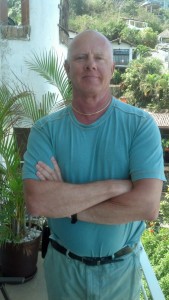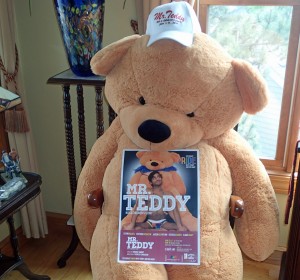 Note: George Smart served as president of Playwrights’ Platform from September 2010 to September 2014. As he prepares to transition out of that role, he agreed to share his thoughts on his work, Playwrights’ Platform, and the challenge of writing for the stage.
Note: George Smart served as president of Playwrights’ Platform from September 2010 to September 2014. As he prepares to transition out of that role, he agreed to share his thoughts on his work, Playwrights’ Platform, and the challenge of writing for the stage.
How long have you been a playwright?
I took my first (and only) playwriting course in 2004 and have been writing ever since.
Why did you start writing plays?
I have always enjoyed creative writing. I have kept a diary for the past 40 years. Once I tried my hand at playwriting it seemed as though that was a very natural way for me to find my voice and communicate with other people.
You seem quite diverse in your playwriting. In just the past couple of years, the pieces you’ve had read at Playwrights’ Platform have included elements of comedy, drama, farce, science fiction, politics, social satire…and that’s just off the top of my head. Is there a genre you feel most comfortable in, or do they all come naturally to you?
Nothing really comes naturally to me. Playwriting for me requires a lot more discipline than I often possess on a given day and it takes considerable effort for me to get started on something. I write what I know and what interests me but feel most comfortable when I can inject humor into a piece as that is how I tend to see life. A world without laughter would be a terrible place to be.
Of all the plays you’ve written so far, do you have a favorite?
My favorite 10 minute play is “Olympic Fever” which has yet to get produced. My favorite full length play is Mr Teddy (not a children’s story) which I self-produced in June of this year.
In a recent e-mail message, as you described your experience staging Mr Teddy, you said that you made lots of mistakes but that “it was the equivalent of an MFA for me” and that you were ultimately happy with the results. What are some of the most productive mistakes that a playwright can make?
Try something different even if you are not sure how it is going to work out. Take risks. Listen, really listen, to what people are saying about your work and don’t assume you have all the answers. Be willing to fail, get up, and start all over again.
What’s the worst or least productive mistake a playwright can make?
To think that someone is going to discover them without their putting in a huge amount of effort. Writing a play is relatively easy compared with selling the play and getting an audience. Self-promotion is key and putting your work in as many possible venues as possible is essential. If you don’t put yourself out there don’t complain when no one knows who you are.
What’s the single most important piece of advice you’d give to a beginning playwright? Believe in yourself and write—a lot—and submit your writing to festivals—frequently. Listen to what others have to say about your work—take in what seems relevant and discard the rest. I have had twenty or so productions of my plays over the past ten years but have submitted over 300 times—so be patient and keep writing. Attend as many plays of other people as you can to see what other people are doing.
As president of Playwrights’ Platform—and as a “regular” member—you’ve seen many productions and staged readings. What do you look for most as an audience member? What do you want out of theater?
I want to be enthralled. I want characters who speak like real people and who are being challenged all the time. I want funny, witty dialogue that sings not plods. I want relevant plots that speak to the real world we live in. I want a beginning, middle and an end that satisfies the degree of energy I have put into the play as an audience member. I want to never be bored.
Being president of Playwrights’ Platform seems like a potentially thankless job. What made you agree to do it?
The organization needed a person to serve as President in order to keep us legal and no one else stepped forward so I did. I wish I had loftier reasons but that is the truth.
What are you most proud of, from your time as president?
Being able to get a new website up and running and stabilizing the membership. Also four successful Summer Festivals.
What was the hardest part of being president?
The transition between the old president and the new one proved to be very challenging. Also lots of old members left the Platform around this time and we were losing membership.
If there’s one thing that Playwrights’ Platform members can do to help the group run smoothly, what is it?
Two things. Volunteer—the platform doesn’t run itself. Remember we are a collective. Second: Change the way they present a critique to fellow playwrights. Three simple rules I would like to see everyone incorporate into their critique are:
1. Pay attention to character, pacing, where a play excites you and where it loses you. Take notes.
2. Listen for repetition, where the play could be tighter, where the dialogue gets preachy or melodramatic or too expository.
3. Don’t offer suggestions on how to rewrite the play or alternative endings
As Playwrights’ Platform president, you worked with both writers and actors. What insights did that give you? Do playwrights and actors get along, generally speaking? Or is there a natural tension? What advice would you give playwrights about working with actors, directors, and other members of the theater world?
In general I have found the AIR actors to be fantastic collaborators with the playwrights. Playwriting really is a collaborative experience. Actors add a whole new dimension to the work and bring out nuances of character that words on a page cannot. My advice to playwrights about working with directors is to never give up your vision and don’t give your work to someone you don’t really know. On the other hand be open to changes that people might suggest as it may improve your work
What advice do you have for the incoming president of Playwrights’ Platform?
Decide early on what the one or two goals you want to achieve over the next few years are as president and get members involved in helping achieve those goals. Also, start the Festival planning very early and set up a committee in the fall to start working on it. Most of all have fun with it.
What’s next for you as a playwright?
I find myself in the unique position of being able to devote myself full time to playwriting due to a forced early retirement. I am currently working on another full length play about gay marriage. I have a few short pieces about the process of growing old that I am working on. I hope to take a screen writing course at Emerson this fall as that is another area I am interested in exploring.
* * *

